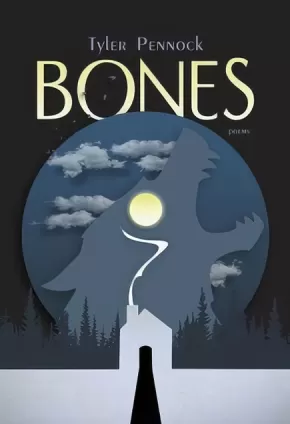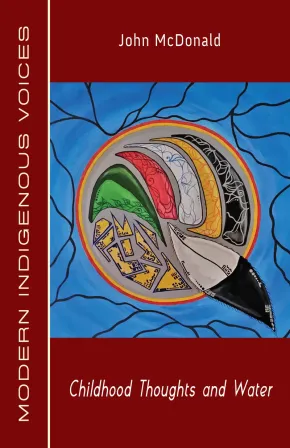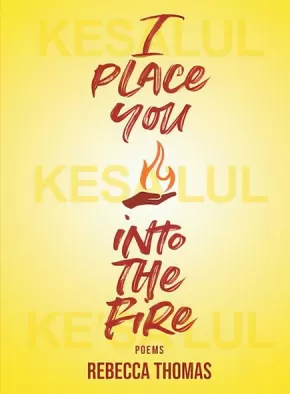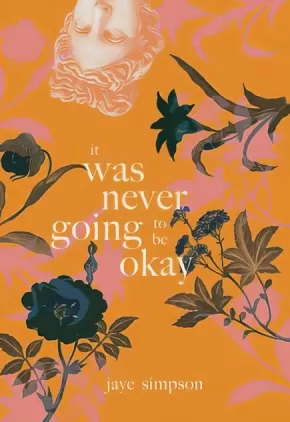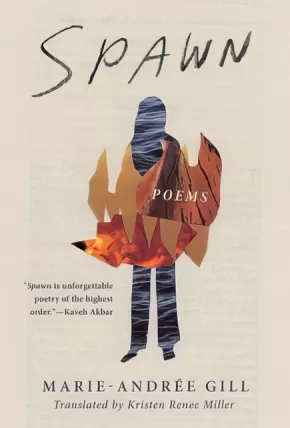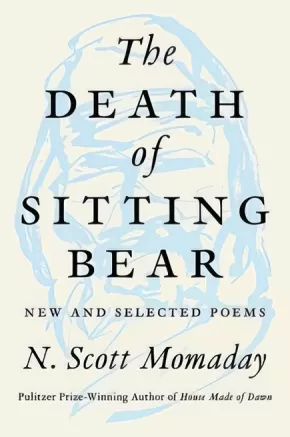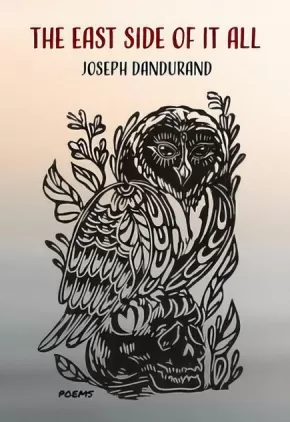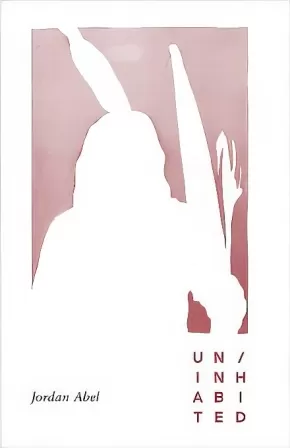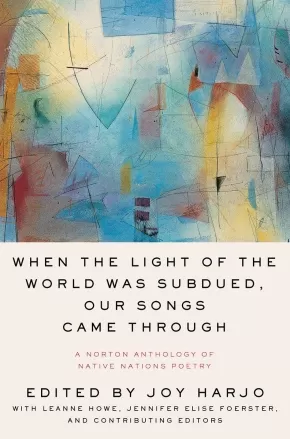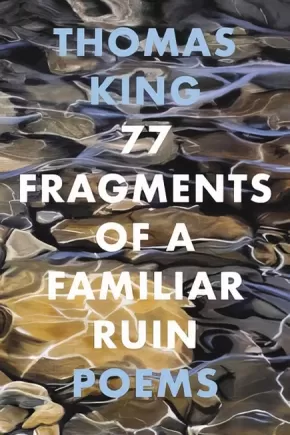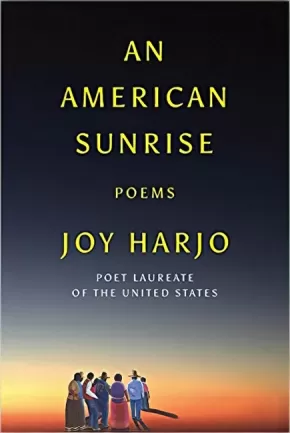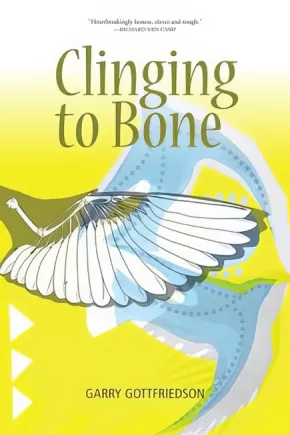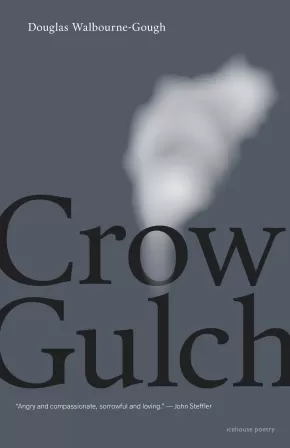Poetry
Synopsis:
Poems about a young two-spirit Indigenous man moving through shadow and trauma toward strength and awareness. Bones, Tyler Pennock's wise and arresting debut, is about the ways we process the traumas of our past, and about how often these experiences eliminate moments of softness and gentleness. Here, the poem's journey inward, guided by the world of dreams, seeking memories of a loving sister lost beneath layers of tragedy and abuse. With bravery, the poems stand up to the demons lurking in the many shadows of their lines, seeking glimpses of a good that is always just out of reach. At moments heartrending and gut-punching, at others still and sweet, Bones is a collection of deep and painstaking work that examines the human spirit in all of us. This is a hero's journey and a stark look at the many conditions of the soul. This is a book for survivors, for fighters, for dreamers, and for believers.
Reviews
"Here is a spare and urgent voice that speaks of 'wounds and beauty,' that gestures to a story of trauma and abuse while offering us a potent journey of self-reckoning and reclamation. Bones entwines brutality with the deepest tenderness and in its clear-eyed way asks us, as poetry must, to re-see the world." --Catherine Bush, author of Accusation and The Rules of Engagement
"Tyler Pennock's poetry unfurls like breath: measured, light, caught, whispering, and vital. It charts memory with a steady hand and unerring allegiance to locating the 'beauty/in terrible things.' Bones addresses the effects of intergenerational, state-sponsored trauma with enviable grace, inscribing and affirming life on the other side of overwhelming pain, abuse, and grief. It carries on, resilient, defiant, gazing at the stars, one breath at a time." --Laurie D. Graham, author of Settler Education
"Tyler Pennock's Bones is a soft meandering through the memories of the narrator's hearthome: a place in which trauma, kinship, abuse, and nostalgia cradle one another in a circle. Here, poetics are deployed to inspect the most minute of objects with such wild abandon that the narrator transplants us into a world rife with sharpness so as to make the image complete, focussed, lifelike, photographic even as he continually 'wish[es he] were like water'. Here we find memory and dream animated in equal measure: two spirits sitting in a basement, a headless mother, a white bear, wihtiko, and a sister slowly vanishing. Lyrical, witty, heart-wrenching, and empowering, Pennock's debut book of poetry is a contemplative epic asking us to ponder the ethics of remembrance in all of its lacings of razing and revitalization." --Joshua Whitehead, author of Full-Metal Indigiqueer and Jonny Appleseed
Additional Information
104 pages | 6.00" x 8.75"
Synopsis:
Childhood Thoughts and Water is a collection of Beat Poetry, Spoken Word, Performance Art and Lyrical Verse. This is a work which journeys into the memories and events of an Urban Indigenous warrior's struggles to reconnect with a language and culture that is seemingly always almost out of reach. The common theme of reconnecting with nature and with water is interspersed with the imagery of childhood recollections and anecdotes about life and love, aspirations and defeats, and the desire to achieve greatness in spite of the obstacles and barriers inherent in a life lived on the fringes, in the shadows and on the streets, in the spotlight and behind the backstage curtain.
Educator & Series Information
This book is part of the Modern Indigenous Voices series.
Additional Information
80 pages | 5.50" x 8.50" | Paperback
Synopsis:
Field Notes for the Self is a series of dark meditations: spiritual exercises in which the poem becomes a forensics of the soul. The poems converse with Patrick Lane, John Thompson, and Charles Wright, but their closest cousins may be Arvo Pärt’s tintinnabulations—overlapping structures in which notes or images are rung slowly and repeatedly like bells. The goal is freedom from illusion, freedom from memory, from “the same old stories” of Lundy’s violent past; and freedom, too, from the unreachable memories of the violence done to his Indigenous ancestors, which, Lundy tells us, seem to haunt his cellular biology. Rooted in exquisitely modulated observations of the natural world, the singular achievement of these poems is mind itself, suspended before interior vision like a bit of crystal twisting in the light.
Reviews
“Here is a poet of whom one can say—quietly, simply, with gratitude—that highest of praises: the real thing.” —Jane Hirshfield, author of The Beauty
“Randy Lundy has entered the place where the masters reside…” —Patrick Lane, author of Washita
Educator & Series Information
This work is part of the Oskana Poetry & Poetics series. Publishing new and established authors, Oskana Poetry & Poetics offers both contemporary poetry at its best and probing discussions of poetry’s cultural role. Oskana is the Cree word for "bones," and it is used with the blessing of Elder Noel Starblanket. The name reflects a commitment to speak to the deepest and most urgent issues of our time, including environmental crisis and Indigenous justice.
Additional Information
96 pages | 5.50" x 8.50"
Synopsis:
The incisive and vital first poetry collection from Mi'kmaw spoken-word poet and former poet laureate of Kjipuktuk (Halifax), Nova Scotia.
We remember tomorrow and a thousand years ago.
From eel weirs to the buffalo.
We remember petroglyphs and Instagram photos.
See, we remember our history,
Without statues, money, or pictures of the Queen.
In Mi'kmaw, three similarly shaped words have drastically different meanings: kesalul means "I love you"; kesa'lul means "I hurt you"; and ke'sa'lul means "I put you into the fire." In spoken-word artist and critically acclaimed author (I'm Finding My Talk) Rebecca Thomas's first poetry collection, readers will feel Thomas's deep love, pain, and frustration as she holds us all to task, along the way mourning the loss of her childhood magic, exploring the realities of growing up off reserve, and offering up a new Creation Story for Canada.
Diverse and probing, I place you into the fire is at once a meditation on navigating life and love as a second-generation Residential School survivor, a lesson in unlearning, and a rallying cry for Indigenous justice, empathy, and equality. A searing collection that embodies the vitality and ferocity of spoken-word poetry.
Additional Information
128 pages | 5.50" x 7.50"
Synopsis:
it was never going to be okay is a collection of poetry and prose exploring the intimacies of understanding intergenerational trauma, Indigeneity and queerness, while addressing urban Indigenous diaspora and breaking down the limitations of sexual understanding as a trans woman. As a way to move from the linear timeline of healing and coming to terms with how trauma does not exist in subsequent happenings, it was never going to be okay tries to break down years of silence in simpson’s debut collection of poetry:
i am five
my sisters are saying boy
i do not know what the word means but—
i am bruised into knowing it: the blunt b,
the hollowness of the o, the blade of y
Awards
- 2021 Indigenous Voices Awards winner for Published Poetry in English.
Reviews
"jaye simpson’s it was never going to be okay is a symphony of unrelenting rage and undying hope that beckons to be heard, seen and held with the utmost care. In this stunning debut they speak truths to the complexities of the body, land and memory through an intimately structured and poignant cadence. This collection will leave you longing for more and, in the legacy of trans Indigenous literature, change lives." — Arielle Twist, author of Disintegrate/Dissociate
"jaye simpson marshals a vast economy of images because their subject matter is as large as an entire country, as the colonial past, as structures of oppression and indifference that undermine Indigenous and trans livability. At the level of craft, simpson makes use of the codes of tragedy, polemic, autobiography and the lyric artfully and powerfully. By the book’s end, buoyed by its final beautiful and tender section, a kind of love letter to trans Indigenous peoples, one is called on to build a new world. In this way, jaye simpson's poetry is a vital artifact of a decolonial future!" — Billy-Ray Belcourt, 2018 Griffin Poetry Prize winner for This Wound Is a World
Additional Information
112 pages | 5.50" x 8.00"
Synopsis:
Postcolonial Love Poem is an anthem of desire against erasure. Natalie Diaz’s brilliant second collection demands that every body carried in its pages—bodies of language, land, rivers, suffering brothers, enemies, and lovers—be touched and held as beloveds. Through these poems, the wounds inflicted by America onto an indigenous people are allowed to bloom pleasure and tenderness: “Let me call my anxiety, desire, then. / Let me call it, a garden.” In this new lyrical landscape, the bodies of indigenous, Latinx, black, and brown women are simultaneously the body politic and the body ecstatic. In claiming this autonomy of desire, language is pushed to its dark edges, the astonishing dunefields and forests where pleasure and love are both grief and joy, violence and sensuality.
Diaz defies the conditions from which she writes, a nation whose creation predicated the diminishment and ultimate erasure of bodies like hers and the people she loves: “I am doing my best to not become a museum / of myself. I am doing my best to breathe in and out. // I am begging: Let me be lonely but not invisible.” Postcolonial Love Poem unravels notions of American goodness and creates something more powerful than hope—in it, a future is built, future being a matrix of the choices we make now, and in these poems, Diaz chooses love.
Additional Information
80 pages | 6.00" x 9.00"
Synopsis:
Spawn is a braided collection of brief, untitled poems, a coming-of-age lyric set in the Mashteuiatsh Reserve on the shores of Lake Piekuakami (Saint-Jean) in Quebec. Undeniably political, Marie-Andrée Gill's poems ask: How can one reclaim a narrative that has been confiscated and distorted by colonizers?
The poet's young avatar reaches new levels on Nintendo, stays up too late online, wakes to her period on class photo day, and carves her lovers' names into every surface imaginable. Encompassing twenty-first-century imperialism, coercive assimilation, and 90s-kid culture, the collection is threaded with the speaker's desires, her searching: for fresh water to "take the edge off," for a "habitable word," for sex. For her "true north"—her voice and her identity.
Like the life cycle of the ouananiche that frames this collection, the speaker's journey is cyclical; immersed in teenage moments of confusion and life on the reserve, she retraces her scars to let in what light she can, and perhaps in the end discover what to "make of herself".
Reviews
"Spawn is an epic journey that follows the ouananiche in their steadfast ability to hold: rigid, shimmering, hardened to the frigid waters of winter, in all of its capacities of and for whiteness. Here, poems summon a spawn of wonderworking dreams: 'a woman risen up from all these winter worlds, heaped with ice [and] ready to start again'." —Joshua Whitehead, author of Jonny Appleseed
"Spawn is unforgettable poetry of the highest order." —Kaveh Akbar, author of Calling a Wolf a Wolf
"Gill's poems are like small treasures clutched in buried tree roots, preserving 'the chalky veins' of ancestral memory pulsing just below our modern hustle." —Kiki Petrosino, author of White Blood
Educator Information
Recommended in the Canadian Indigenous Books for Schools 2020/2021 resource list for grade 12 for English Language Arts and Social Justice.
Caution: Some foul language, sexual and violent content.
Additional Information
96 pages | 5.25" x 7.75" | Translated by Kristen Renee Miller
Synopsis:
Pulitzer Prize winner and celebrated American master N. Scott Momaday returns with a radiant collection of more than 200 new and selected poems rooted in Native American tradition.
“The poems in this book reflect my deep respect for and appreciation of words. . . . I believe that poetry is the highest form of verbal expression. Although I have written in other forms, I find that poems are what I want and need most to read and write. They give life to my mind.”
One of the most important and unique voices in American letters, distinguished poet, novelist, artist, teacher, and storyteller N. Scott Momaday was born into the Kiowa tribe and grew up on Indian reservations in the Southwest. The customs and traditions that influenced his upbringing—most notably the Native American oral tradition—are the centerpiece of his work.
This luminous collection demonstrates Momaday’s mastery and love of language and the matters closest to his heart. To Momaday, words are sacred; language is power. Spanning nearly fifty years, the poems gathered here illuminate the human condition, Momaday’s connection to his Kiowa roots, and his spiritual relationship to the American landscape.
The title poem, “The Death of Sitting Bear” is a celebration of heritage and a memorial to the great Kiowa warrior and chief. “I feel his presence close by in my blood and imagination,” Momaday writes, “and I sing him an honor song.” Here, too, are meditations on mortality, love, and loss, as well as reflections on the incomparable and holy landscape of the Southwest.
The Death of Sitting Bear evokes the essence of human experience and speaks to us all.
Reviews
“These are the poems of a master poet, born of an age when our ears were not so bent towards digital production. Or should I say, these are the poems of a bear who has walked through several generations and stands before us, breathing clouds into a cold dawn, bearing this book of poetry. The bear’s journey is mythic, a migration through tragedy and beauty, over lands rich with horses and stories. When you read these poems, you will learn to hear deeply the sound a soul makes as it sings about the mystery of dreaming and becoming.”— Joy Harjo, Mvskoke Nation, U.S. Poet Laureate
"An admirable capstone to a distinguished literary career, this splendid selection should be a treasure for Momaday’s readers and an excellent introduction for those new to Native American writing."— Library Journal (starred review)
Additional Information
192 pages | 6.00" x 9.00"
Synopsis:
The East Side of It All draws on Joseph Dandurand’s first-hand experiences of life as a drug user and single-room occupant in Vancouver’s Downtown Eastside, and of the ongoing process of healing through reconnection with family, the natural world and traditional Indigenous (Kwantlen) storytelling. His voice is lyrical yet intimate, obscured yet sitting with you at the kitchen table having a cigarette. The East Side of It All is the journey of a broken man who finally accepts his storytelling gift and shares with the world his misery, joy and laughter.
Additional Information
96 pages | 5.50" x 8.00"
Synopsis:
This is the second edition of award-winning Nisga’a poet Jordan Abel’s second collection of poetry, Un/inhabited, which maps the terrain of the public domain to create a layered investigation of the interconnections between language and land.
Abel constructed the book’s source text by compiling ninety-one complete western novels found on Project Gutenberg, an online archive of public domain works. Using his word processor’s Ctrl+F function, he searched the document in its totality for words that relate to the political and social aspects of land, territory, and ownership. Each search query represents a study in context (How was this word deployed? What surrounded it? What is left over once that word is removed?) that accumulates toward a representation of the public domain as a discoverable and inhabitable body of land.
Featuring essays by Project Space founder Tracy Stefanucci and independent curator Kathleen Ritter – the first pieces of scholarship on Abel’s work – Un/inhabited reminds us of the power of language as material and invites us to reflect on what is present when we see nothing.
Additonal Information
240 pages | 5.40" x 8.50" | Paperback | 2nd Edition
Synopsis:
United States Poet Laureate Joy Harjo gathers the work of more than 160 poets, representing nearly 100 indigenous nations, into the first historically comprehensive Native poetry anthology.
This landmark anthology celebrates the indigenous peoples of North America, the first poets of this country, whose literary traditions stretch back centuries. Opening with a blessing from Pulitzer Prize–winner N. Scott Momaday, the book contains powerful introductions from contributing editors who represent the five geographically organized sections. Each section begins with a poem from traditional oral literatures and closes with emerging poets, ranging from Eleazar, a seventeenth-century Native student at Harvard, to Jake Skeets, a young Diné poet born in 1991, and including renowned writers such as Luci Tapahanso, Natalie Diaz, Layli Long Soldier, and Ray Young Bear. When the Light of the World Was Subdued, Our Songs Came Through offers the extraordinary sweep of Native literature, without which no study of American poetry is complete.
Reviews
This anthology is revelatory and stunning.… It shows the remarkable strength and diversity of Native poetry, which vitalizes all of American poetry. It is essential reading.—Arthur Sze, National Book Award–winning author of Sight Lines
Additional Information
352 pages | 6.14" x 9.29" | Paperback
Synopsis:
Timely, important, mischievous, powerful: in a word, exceptional.
Seventy-seven poems intended as a eulogy for what we have squandered, a reprimand for all we have allowed, a suggestion for what might still be salvaged, a poetic quarrel with our intolerant and greedy selves, a reflection on mortality and longing, as well as a long-running conversation with the mythological currents that flow throughout North America.
Additional Information
96 pages | 6.00" x 9.00"
Synopsis:
A stunning new volume from the first Native American Poet Laureate of the United States, informed by her tribal history and connection to the land.
In the early 1800s, the Mvskoke people were forcibly removed from their original lands east of the Mississippi to Indian Territory, which is now part of Oklahoma. Two hundred years later, Joy Harjo returns to her family’s lands and opens a dialogue with history. In An American Sunrise, Harjo finds blessings in the abundance of her homeland and confronts the site where her people, and other indigenous families, essentially disappeared. From her memory of her mother’s death, to her beginnings in the native rights movement, to the fresh road with her beloved, Harjo’s personal life intertwines with tribal histories to create a space for renewed beginnings. Her poems sing of beauty and survival, illuminating a spirituality that connects her to her ancestors and thrums with the quiet anger of living in the ruins of injustice. A descendent of storytellers and “one of our finest—and most complicated—poets” (Los Angeles Review of Books), Joy Harjo continues her legacy with this latest powerful collection.
Additional Information
144 pages | 5.50" x 8.25"
Synopsis:
Garry Gottfriedson's Clinging to Bone digs into the marrow, heart and soul of the human condition. Looking deeply into the Secwepemc (Shuswap) world of today, he examines betrayal, grief, love and survival. He states, "the broken winged sparrows are lost in flight, surviving starvation in the empty belly of wind." In "Foreigner" he describes how "my skin is the scent of Secwepemcúlucw / a rez Indian, a foreigner / in my own homeland / can you imagine that?" (where "Secwepemcúlucw" means land of the Shuswap). But he also sees humour in the very mechanics of surviving as an Indigenous individual in the Canada of today. His poetry will draw you into love, laughter and sorrow, but leave you contemplating your own survival. A glossary of Secwepemc words is included.
Reviews
"Secwepemc poet, rancher, and teacher Garry Gottfriedson brings themes of identity, environment, and politics in his newest work Clinging to Bone. This collection of poems emerges from Gottfriedson’s journey as a Secwepemc man growing up in his traditional territory. Throughout the work are many beautiful and colourful images of nature. His work explores how land shapes one’s identity and how concepts of home have been altered by settlement and colonialism. Gottfriedson also touches upon many difficult intersections including Residential Schools, church abuses, and environmental destruction. In the end, his work is a (re)affirmation of
Secwepemc sovereignty through narratives of caregiving and relationship to place. Thought-provoking and accessible for high school students, this work is valuable in our schools today." - Canadian Indigenous Books for Schools 2020/2021
Educator Information
Recommended in the Canadian Indigenous Books for Schools 2020/2021 resource list for grades 11 and 12 for English, Creativie Writing, Literary Studies and Social Justice. Also a useful for Teacher Resource.
Additional Information
100 pages | 6.00" x 9.00"
Synopsis:
From the author: I cannot let the story of Crow Gulch — the story of my family and, subsequently, my own story — go untold. This book is my attempt to resurrect dialogue and story, to honour who and where I come from, to remind Corner Brook of the glaring omission in its social history.
"These deeply engaging poems — courageous, shrewdly observed, disillusioned — give sharp, prsonal expression to the harsh-beautiful landscape of western Newfoundland, and the human community precariously, stubbornly rooted there." — John Steffler
In his debut poetry collection, Douglas Walbourne-Gough reflects on the legacy of a community that sat on the shore of the Bay of Islands, less than two kilometres west of downtown Corner Brook.
Crow Gulch began as a temporary shack town to house migrant workers in the 1920s during the construction of the pulp and paper mill. After the mill was complete, some of the residents, many of Indigenous ancestry, settled there permanently — including the poet's great-grandmother Amelia Campbell and her daughter, Ella — and those the locals called the "jackytars," a derogatory epithet used to describe someone of mixed French and Mi'kmaq descent. Many remained there until the late 1970s, when the settlement was forcibly abandoned and largely forgotten.
Walbourne-Gough lyrically sifts through archival memory and family accounts, resurrecting story and conversation, to patch together a history of a people and place. Here he finds his own identity within the legacy of Crow Gulch and reminds those who have forgotten of a glaring omission in history.
Reviews
"These deeply engaging poems — courageous, shrewdly observed, disillusioned — give sharp, personal expression to the harsh-beautiful landscape of western Newfoundland and the human community precariously, stubbornly rooted there. A sense of conflict drives through this work, a reflection of the traditional struggle to gain a living from the sea and rocky land but also a raw exploration of the conflict between poverty and privilege, honesty and propriety." — John Steffler, April 2019
"Crow Gulch announces an important poet. The differences Douglas Walbourne-Gough explores between class and ethnicities are as hard as Newfoundland's rock, as shifting as the foundations of a forcibly resettled Crow Gulch. This book is a conversation between a rude landscape, the displaced or dispossessed, and a narrator searching for belonging." — Stephanie McKenzie, April 2019
"Bent low and clund to a coast, Walbourne-Gough lets the land shape him. Brilliant and weathered observation interlaces family and archive to render present and necessary the memory of Crow Gulch. Here is a day's labour, a fretting walk along the tracks, a house 'that lets in snow at the seams,' grandmother's kitchen. Hear still 'her peals of laughter against the far shore and all that lives on in this book.'" — Cecily Nicholson, April 2019
Additional Information
80 pages | 5.50" x 8.50"

